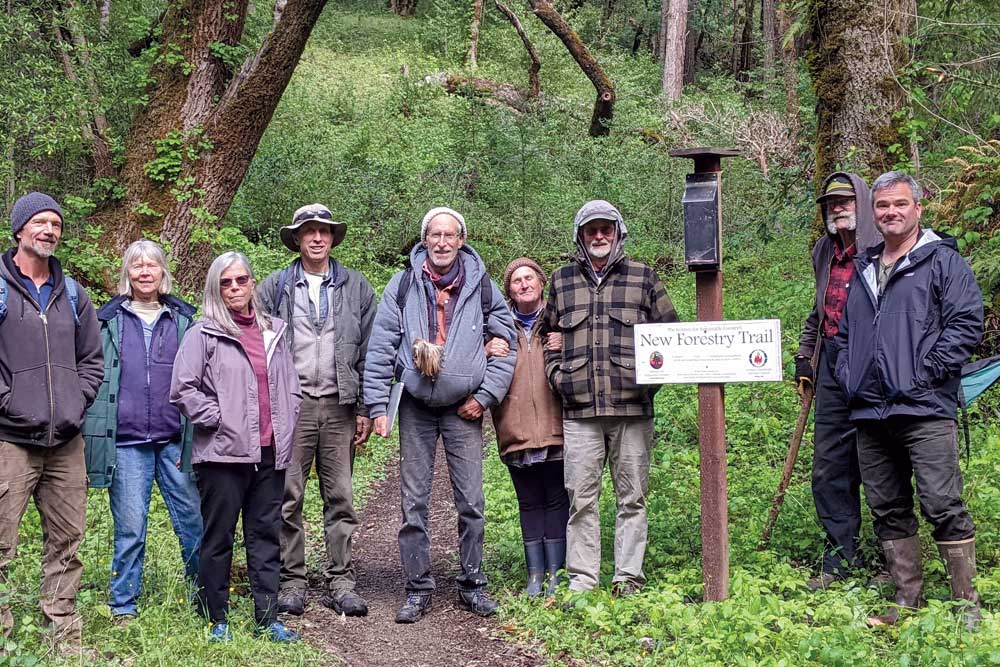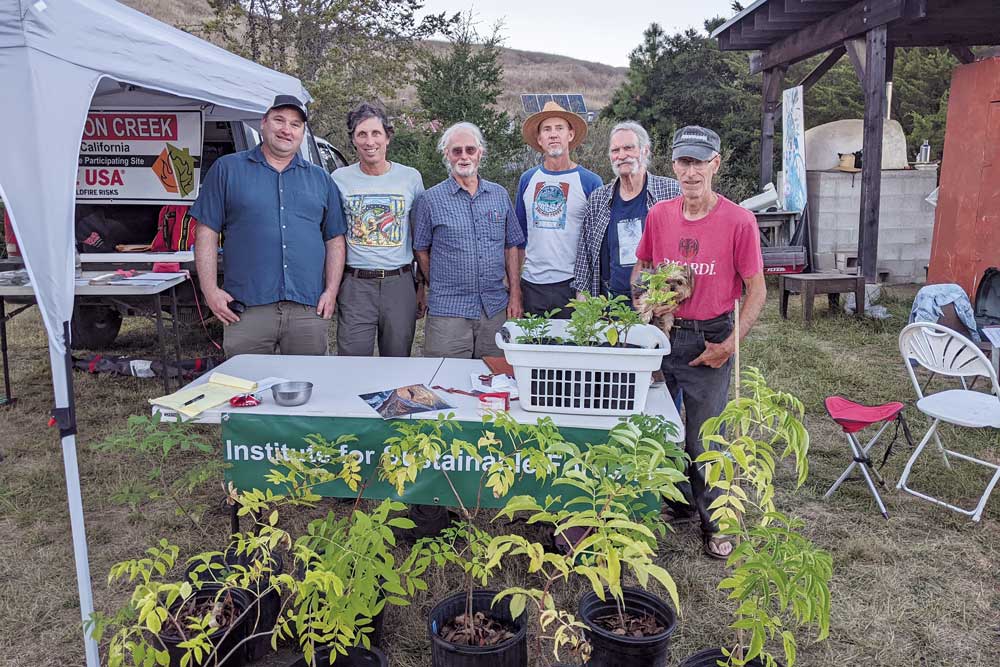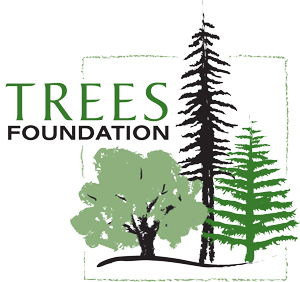Institute for Sustainable Forestry: A Brief Retrospective, Current Update on Projects, and Looking Ahead

Submitted by Chip Tittmann, President; Greg Condon, Treasurer; Gray Shaw, Secretary; and Board Directors Richard Gienger, Jeff Hedin, Liz Harwood, and Connie Smyser
Over the last 39 years, ISF has built a legacy of promoting forest health, forest protection, and sustainable forest products utilization in NW California, all while collaborating with local NGOs, Tribes, and public agencies.
Our Roots
Having witnessed over-harvesting of old—and second-growth conifers in the 1960s and 1970s, Jan Iris and a cabal of forest activists established a new, alternative business model to utilize marginal hardwood tree species that were ignored by softwood timber operators. These hardwoods—tan oak and madrone—were being poisoned and burned as slash while redwood and Douglas-fir were clear-cut, replanted as a plantation, and then harvested again on 40—to 60-year rotations. Wild Iris Wood Products, formed in 1985, introduced tan oak flooring and madrone trim, flooring, and wainscoting.
Harvests of local timberlands also needed to be scaled back, with longer rotations and awareness of the ecological value of wildlife habitat, forest soil, and water for fish reproduction. The Institute for Sustainable Forestry emerged from Wild Iris to advocate for quality control of timber harvests. ISF proposed a forest management protocol with guidelines and restraints to ensure protection for old growth, fair wages for timber workers, responsible forest management, and diversified forest products beyond the few remaining stands of softwoods. ISF’s Ten Elements of Sustainability became the basis of FSC Certification, an international lumber standard based on ecological forest management.
From those impressive roots, ISF has continued its quest for balanced timber harvests, awareness of the beneficial relationships of all forest inhabitants, and the economic viability of forest communities.

Photo by Kerryanna Reynolds
A Broad Spectrum of On-the-Ground Activities
Over the last five years, the Institute for Sustainable Forestry has expanded its mandate and outreach. ISF sponsored and cosponsored fire workshops that promote prescribed fire, biochar, and fuel-reduction practices, stressing the importance of friendly fire management for forest health and the value of good fire on the landscape. Our collaborators include the Garberville Rotary Club, KMUD, the Mateel Community Center, CAL FIRE, BLM, USFS, Mattole Restoration Council, Friends of the Lost Coast, Trees Foundation, Forest Reciprocity Group, Eel River Recovery Project, North Coast Resource Partnership, The Headwaters Fund, Humboldt Area Foundation, Humboldt County Prescribed Burn Association, the Southern Humboldt Community Park, and many of the local Tribes: Kato, Yuki, Wailaki, Wiyot, and Hoopa.
ISF also initiated a Sustainable Forestry Journalism Project that has produced and aired more than 50 informational radio shows promoting good forestry practices, describing add-on values of neglected forest materials, and recognizing local citizens who have been doing the experimental and groundbreaking work of sustainable forest management.
Agroforestry—the use of non-timber forest products such as native nuts, fruits, berries, basket materials, herbs, and mushrooms—has become another primary focus of ISF. We have cultivated elderberries, chestnuts, native plums, and hazel nuts for sale and as a fundraising tool for local non-profits.
Through the leadership and inspiration of Board Member Liz Harwood, we brought together a large group of Indigenous Americans, fuel-reduction experts, trail enthusiasts, and oak woodland and meadow specialists to restore Southern Humboldt Community Park. Grants have been awarded for gully remediation, a native and agroforestry plant nursery, expanding the New Forestry Trail with signage and benches, and reintroducing cultural fire at the park. This good fire will help to restore production of Indigenous basket-making materials and other plants traditionally used by local native peoples. A merging of Indigenous people’s and non-natives’ interests has sparked exciting collaboration at the Southern Humboldt Community Park.
ISF is also instrumental in organizing forest thinning and fuel-reduction projects with grants from CAL FIRE. Recently Chip Tittmann, Tim Bailey, the Mattole Restoration Council, and ISF participated in creating a $4.9 million funded project that is helping build fire resilience in the Salmon Creek and Mattole watersheds. Another $4.9 million funded project is occurring in the Red Mountain area east of Piercy that was fostered by Jeff Hedin and ISF. Both these projects have funded and enabled local crews and forest restorationists to work in their own communities.
Looking Ahead, Adapting to Climate Change
As climate change threatens life on Earth, our forests represent a vital defense. ISF’s priorities going forward will focus on the forest as a carbon-sequestering system and productive food source. Building aware and adaptive communities capable of remediation is key to a healthy and sustainable world.
Our vision is a forest teeming with life, where natural systems support the biodiversity of every living thing that evolved to be there. This means bringing the forest back to the healthy landscape it once was, not a monoculture devoid of humans. We need the gardener’s shadow, people tending and harvesting.
Reciprocity
The restoration economy will help bridge our economic transition in the near future while we learn what to grow and how to tend. Industry will evolve with what the forest provides, and we and the forest both benefit. We will become intimate with our native flora and fauna, our geology and geography.
The old villages of past enterprises will be re-peopled. From Branscomb to Weott, Laytonville to Phillipsville, communities will rebuild with a new ethos of restoration and respect. Back to our future.
Be Part of Our Work and Network
ISF has gratefully collaborated with Trees Foundation for many years to promote and publicize events, coordinate with regional non-profits, and share expertise.
As ISF moves toward its 40th anniversary next year, we encourage all interested forest enthusiasts to join our organization, expand further networking, and increase collaboration with others. We are looking for radio journalists and show producers, tree and native plant nursery green thumbs, grant writers, board members, advisory committee members, workshop and tour leaders, and policy wonks seeking to move the legislatures, timberland owners, and local governments toward better forest practices.
Visit our website at instituteforsustainableforestry.com and join our team in any capacity for which you have a passion, interest, or skill.
